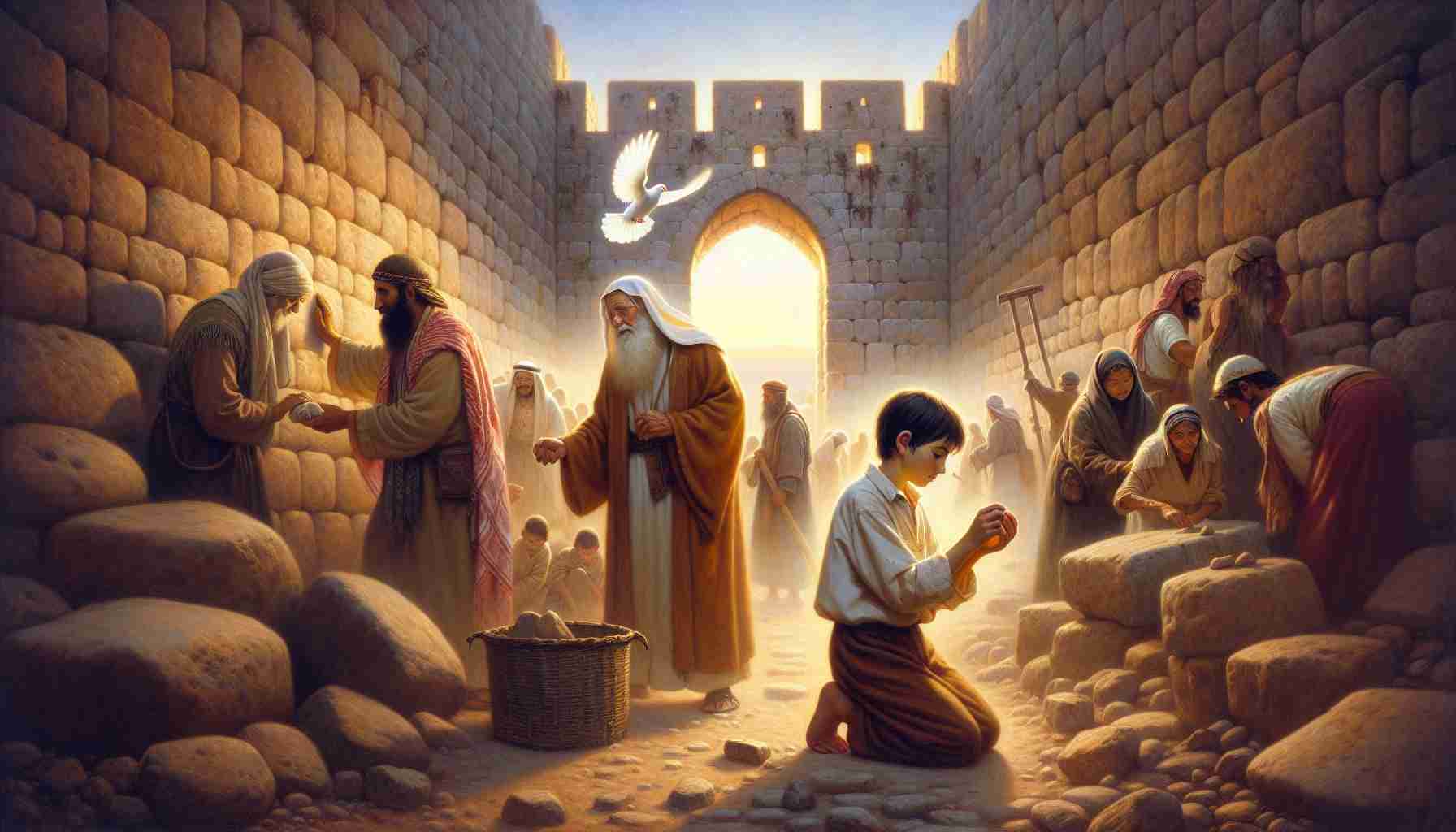

The sun burned hot against my neck as I gripped the end of the stone slab. My fingers ached, but I didn’t let go. I had waited too long for this moment—for the walls of Yerushalayim to rise again.
I lived in the days of Nechemia, the governor from Persia who returned to rebuild the broken walls of our city. I was just a gatekeeper’s son, too young to fight, too stubborn to stand by. My name? It doesn’t really matter. What mattered was what I saw—and how it changed me.
The walls had been destroyed for so many years that most people stopped believing they could ever be rebuilt. Burned gates, fallen stones, ash where once there was glory. I had never seen Yerushalayim whole, not since the Babylonians tore her apart. But then Nechemia came.
He didn’t arrive with soldiers or riches. He came with letters from the Persian king and a heart full of prayers. When he walked among the ruins at night, examining each broken tower in silence, something in me stirred. It was as if hope itself had entered the city.
Not everyone welcomed his plan. There were enemies—powerful ones—like Sanvalat and Toviyah, who mocked us and tried to stop the work. “What are you doing?” they jeered. “Even a fox could knock over these walls!” Their words stung, but Nechemia didn’t answer with anger. He answered with prayer.
“We are your servants, Hashem,” he would say—the name we use when we speak of God with awe. “Strengthen our hands.”
That prayer guided us day and night. We worked with one hand, and with the other we held weapons. My shift was by the Sheep Gate. I learned to lay stones with my father in the morning and watch the shadows for enemies at night. We barely slept. At times, I wondered if we were fools.
One afternoon, as the sun began to fall behind the hills, a cry rang out. A messenger ran down the line of workers. “Nechemia is in danger! They’re trying to lure him from the city!” Another plot. Another threat.
“They fear him,” my father whispered.
And they did. Because Nechemia would not come down. “I am doing a great work and cannot stop,” he said.
That night I stood as lookout above the Valley Gate. I watched the stones below glow orange from torchlight as families worked and guarded together. I felt something new warming in my chest—not the fire of torches but of purpose. I knew then what justice looked like. It wasn’t about revenge. Justice was restoring what was broken. It was standing for what was right, even when it shook your knees.
We finished the wall in fifty-two days. Fifty-two! It still feels like a miracle.
Now when I walk beside those stones, I touch them as I pass. Not because they are strong—but because we became strong, through trial and through faith.
We rebuilt Yerushalayim. But Hashem rebuilt us.
The sun burned hot against my neck as I gripped the end of the stone slab. My fingers ached, but I didn’t let go. I had waited too long for this moment—for the walls of Yerushalayim to rise again.
I lived in the days of Nechemia, the governor from Persia who returned to rebuild the broken walls of our city. I was just a gatekeeper’s son, too young to fight, too stubborn to stand by. My name? It doesn’t really matter. What mattered was what I saw—and how it changed me.
The walls had been destroyed for so many years that most people stopped believing they could ever be rebuilt. Burned gates, fallen stones, ash where once there was glory. I had never seen Yerushalayim whole, not since the Babylonians tore her apart. But then Nechemia came.
He didn’t arrive with soldiers or riches. He came with letters from the Persian king and a heart full of prayers. When he walked among the ruins at night, examining each broken tower in silence, something in me stirred. It was as if hope itself had entered the city.
Not everyone welcomed his plan. There were enemies—powerful ones—like Sanvalat and Toviyah, who mocked us and tried to stop the work. “What are you doing?” they jeered. “Even a fox could knock over these walls!” Their words stung, but Nechemia didn’t answer with anger. He answered with prayer.
“We are your servants, Hashem,” he would say—the name we use when we speak of God with awe. “Strengthen our hands.”
That prayer guided us day and night. We worked with one hand, and with the other we held weapons. My shift was by the Sheep Gate. I learned to lay stones with my father in the morning and watch the shadows for enemies at night. We barely slept. At times, I wondered if we were fools.
One afternoon, as the sun began to fall behind the hills, a cry rang out. A messenger ran down the line of workers. “Nechemia is in danger! They’re trying to lure him from the city!” Another plot. Another threat.
“They fear him,” my father whispered.
And they did. Because Nechemia would not come down. “I am doing a great work and cannot stop,” he said.
That night I stood as lookout above the Valley Gate. I watched the stones below glow orange from torchlight as families worked and guarded together. I felt something new warming in my chest—not the fire of torches but of purpose. I knew then what justice looked like. It wasn’t about revenge. Justice was restoring what was broken. It was standing for what was right, even when it shook your knees.
We finished the wall in fifty-two days. Fifty-two! It still feels like a miracle.
Now when I walk beside those stones, I touch them as I pass. Not because they are strong—but because we became strong, through trial and through faith.
We rebuilt Yerushalayim. But Hashem rebuilt us.